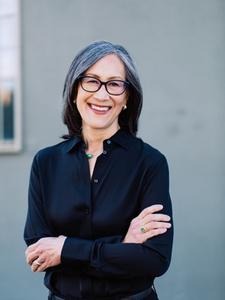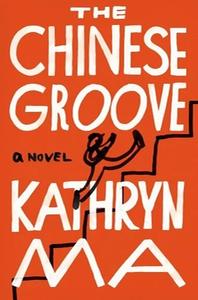
|
|
| photo: Andria Lo | |
Kathryn Ma began publishing fiction in her 40s after leaving her law practice to learn how to write the kinds of books she loved to read. Her first book, All that Work and Still No Boys, won the Iowa Short Fiction Award. Her debut novel, The Year She Left Us, was a New York Times Editors' Choice and an NPR "great read" of the year. Her third book, The Chinese Groove (Counterpoint, January 24, 2023), is a novel that follows a young man in search of his destiny.
Handsell readers your book in 25 words or less:
A young Chinese adventurer arrives in San Francisco, upending his American relatives' grief-stricken lives. Funny, fresh, full of unexpected plot twists--first page to last.
On your nightstand now:
A stack of plays by American playwrights who inspire me: The Great Leap, Cambodian Rock Band and King of the Yees by Lauren Yee; Straight White Men by Young Jean Lee; and Caught by Christopher Chen. I like to read plays after I see them, and sometimes I read more by the same playwright to get a sense of the body of work. I'm reading for themes and the nervy turn that takes the action in unexpected directions. For the "great leap" that can break a work wide open.
Favorite book when you were a child:
I recently rediscovered Chinese Tales of Folklore by S.Y. Lu Mar (Criterion Books, 1964). When I cracked it open, the stories tumbled out like keepsakes tipped from a shoebox of treasures. At the heart of my new novel, The Chinese Groove, is the legend of the Peach Blossom Forest, which my mother learned as a child. When I was growing up, reading folktales and legends gave me a glimpse into my immigrant parents' history and culture. The stories featured every kind of character from wise emperors to wayfaring young people, and they were often funny, too. The ancients were smart. They knew their audience and worked the gig well. That's why the stories still keep us entertained.
Your top five authors:
Austen, Dickens, Chekhov, Wharton, Shakespeare. Whether I'm seeking or despairing, they never let me down.
Book you've faked reading:
I haven't finished Moby-Dick. My daughter gave me a beautiful Arion Press edition. I opened it just now and ran my hand over the page. The type is gorgeous. I've got to lash myself to the mast and try again.
 Book you're an evangelist for:
Book you're an evangelist for:
The Boy in the Field by Margot Livesey. A novel of danger, unerring honesty and tender intimacy.
Book you've bought for the cover:
Radiant Fugitives, a novel by Nawaaz Ahmed. I didn't know the book or the author when I picked it up from the new fiction table at a local bookshop. I was captivated by the energy and contradictions of the images, which communicate beauty and light but also blood and disturbance. The back cover, with its repeated but altered motif, totally sold me. I bought the book and dove in, later realizing that I'd read about the novel in the New Yorker, which highlighted how this complex family story intertwines the personal and political. With such a strong cover, one might worry that the book inside can't deliver what the cover art promises. Jaya Miceli's jacket design and Ahmed's writing combine to make a beautiful, insightful book.
Book you hid from your parents:
Fanny Hill. I plucked it from the family bookcase. I didn't have to hide it. I just had to put it back exactly where I found it.
Book that changed your life:
The Magician's Nephew by C.S. Lewis, originally the sixth book in the seven-book Chronicles of Narnia. I was blown away as a kid when I realized it was a prequel. That was my first inkling that an author has total control over plot, structure, time and all the rest. You can write the novel however you see it, hear it and feel it, as long as you make it good.
Favorite line from a book:
"Everyone, real or invented, deserves the open destiny of life." --Grace Paley, "A Conversation with My Father"
Five books you'll never part with:
The Bungalow by Lynn Freed; The Candy House by Jennifer Egan; Embassy Wife by Katie Crouch; Why We Swim by Bonnie Tsui; Queen Sugar by Natalie Baszile; Forbidden City by Vanessa Hua.
I have to name six and could name many more. In addition to being wonderful books, they were all written by authors who are mothers. To write a book while raising children takes more adjustments, compromises and bargains (with others and with oneself) per minute than there are petals on a daisy. Bouquets to these writers and all the mothers out there, writing.
Book you most want to read again for the first time:
Lincoln in the Bardo by George Saunders. It's a very strange novel. It's also one of the most moving books I've ever read. My previous novel, The Year She Left Us, includes a scene in a steep hillside cemetery, nothing like the bardo that Saunders describes, but I was interested, as he was, in evoking the universality of grief and mourning. I know that rereading Saunders's portrayal of Lincoln at his young son's grave would bring me greater understanding of the book's form and substance, but the shock of reading it for the first time is something I can't repeat and will long remember.
Book you learned about at Shelf Awareness:
The Flamingo, a children's book by Guojing. There are a lot of kids in my life of different ages and interests, and I rely on recommendations to help me choose books for them. This book, which has very few words, is described as a "visual feast." I can't wait to give this away and enjoy it with a young reader. Thanks for the recommendation!

